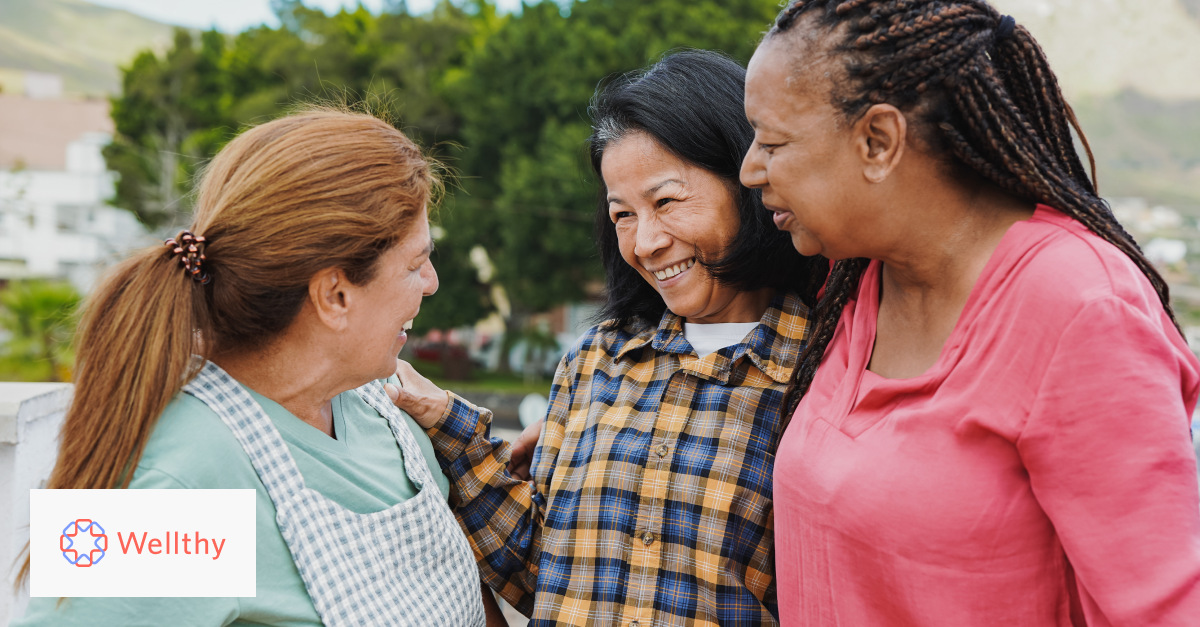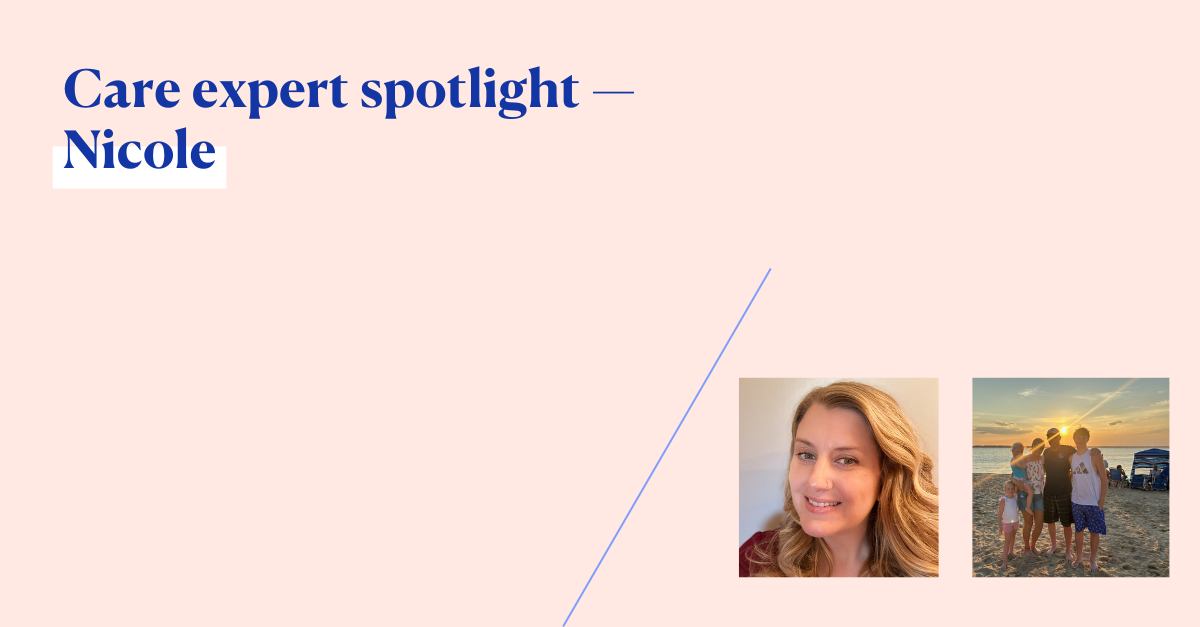With our Care Expert Spotlight series, we’re taking a peek into the lives of Wellthy's amazing care professionals.
This month we spoke with Amy, a Care Coordinator who works primarily with aging populations, in-home support, and families in crisis. Wellthy’s team of Care Coordinators and Advisers work directly with families to understand their care needs, create a care plan, prioritize tasks, and get things done on their behalf.
Amy is also a Moderator for Wellthy Community, a peer support network for Wellthy members allowing family caregivers to connect with each other online. For more information on Wellthy Community, check out this post.
What is your background in?
My degrees are in Psychology and Rehabilitation Studies. I’ve spent most of my 20+ year career in social work, primarily working with the elderly and mentally ill, helping with in-home services and case management. Most recently, I worked in facility licensing for assisted living facilities and nursing homes.
For the aging population, I worked with people who needed a high level of care, but didn’t want to leave their homes. To help them accomplish that, I'd help figure out all the pieces that needed to be in place in order to keep them in their home. I also did this type of case management with the dually diagnosed population.Typically this means they have a mental illness diagnosis and a substance abuse diagnosis. This case management is a bit more intense than the elderly. I managed their in-home care, financials, coordinated their treatment appointments, and found support in the community to assist them in living independently.
How do you support families at Wellthy?
I’ve been at Wellthy for about 2 years now as a Care Coordinator. I work primarily with the aging population, but I am also very experienced in helping members in crisis situations. Recently, I assisted a single person who was in an accident and was hospitalized for a long period of time. She had very little family and community support. We assisted her through her employment documents for leave, found financial resources, transportation resources, and legal assistance. Once she was discharged from the hospital, we found her in home support, transportation and providers to manage her aftercare.
With my aging care projects, we help families plan for care a lot of the time and put things in place to assist with keeping the individual at home independently. We also have a lot of care projects that come to us in crisis, when a family members health has made a sudden change and they need immediate resources and guidance.
In each of these situations, people came to us with a problem and we helped determine what they needed. We don't expect people to come to us knowing exactly what to ask for. We just ask that they tell us what their current situation is, if there is anything they need immediate help with, and guide them from there.
What is your personal caregiving story?
I’m the primary caregiver for my 84-year old mother who lives independently. Since I live nearby, I take care of all of her appointments and finances. A key takeaway from being the primary caregiver for my mom is that care is cyclical. Some days, she’s great on her own, and other days, things aren’t going well at all with her. At Wellthy, we really acknowledge that and flex our services to meet changing needs. I have a Care Project open for my mother, and it’s great to be able to pause it when times are good, and then unpause it and have a Care Coordinator on standby for when I need support like locating meal delivery or transportation options. It’s very helpful to be able to hop back in instead of starting all over every time I need something.
With siblings, how do you all delegate care responsibilities for your mom?
My siblings want to be kept in the loop, so we call or FaceTime often. I’m usually the planner so I’ll coordinate times for us all to get together, which makes my mom really happy. My sister and I alternate taking my mom to appointments too.
To get to this place of running smoothly, we’ve had a lot of very open conversations. For example, when one sibling wants to be involved but lives farther away, we have a realistic conversation about what that looks like. That way, they feel heard and involved in my mom’s care, but my sister and I can still feel in control since we live the closest to our mom.
What advice would you give to a first-time caregiver?
Plan for the future. If you’re just starting your care journey, get as much information together as you can so that if a crisis occurs, it’s all located in one place. Being open to doing these things now will make a world of difference if an illness, fall or accident occurs.
The biggest mistake I see is caregivers not accepting help and thinking they can manage it on their own. They don’t reach out for help until they’re burned out and frustrated and don’t know where to turn next.
How does your background help you be a great Care Coordinator at Wellthy?
I know how to put all the pieces of the puzzle together. I know where families are coming from and understand how to communicate with them to move things forward. I have a good grasp on family dynamics and while I can’t see the future, I can take an educated guess on where a situation is headed and help the family prepare for that future.
What's one specific way that someone can plan ahead for future care needs?
First, get your powers of attorney (POA) in place, especially a medical POA! As an example, let’s say that your mom had an accident or stroke and is not in a cognitive place to make decisions for herself. Without a medical POA, you can’t make any decisions on her behalf. Having conversations now and learning about the different types of POA is a good start. This also opens up a conversation on what they would like the future to look like and help you plan based on their wishes.
For instance, if my mother had an accident tomorrow and she didn't have a DNR set up and I wasn’t listed as her medical POA, then the hospital would have no choice but to put her on life support.
Secondly, know what your loved one’s wishes are – these are hard conversations to have, but I have resources I share with the families I work with. So often, families don’t talk about aging and dying. They’re not pleasant things to talk about, so many families just avoid them. This leaves so many unanswered questions and guessing on decisions when the family is in crisis.
What is one of the most memorable Care Projects you've worked on?
I’m currently working with a family who was one of my first projects at Wellthy two years ago – they feel like family to me at this point.
The mom has multiple sclerosis, so we helped get her a new scooter chair and coordinate home modifications, like putting a ramp in. Both of the sons live at least a 2-hour drive away, so they were balancing their mom’s needs with caring from afar. Together we have gone through quite a bit. We have assisted with finding and vetting multiple providers, in home care and resources for the family. Their father unfortunately passed away after we started working together, but I also helped set up hospice and research benefits for him before his passing. Additionally, we assisted the family plan for this regarding benefits, insurance and the estate.
After that, the mom’s strength really started to decline, so she moved in with her sister, which I helped coordinate. I actually talked to the mom earlier today and she’s doing really well. She’s settled, going to a grief support group, and has in-home care. It’s been really rewarding to help them through the evolution of the last few years of their family’s lives. It warms my heart to know how much I’ve helped them. It’s also been amazing to watch how they’ve progressed as a family and gotten better at communicating care needs through Wellthy’s platform.







